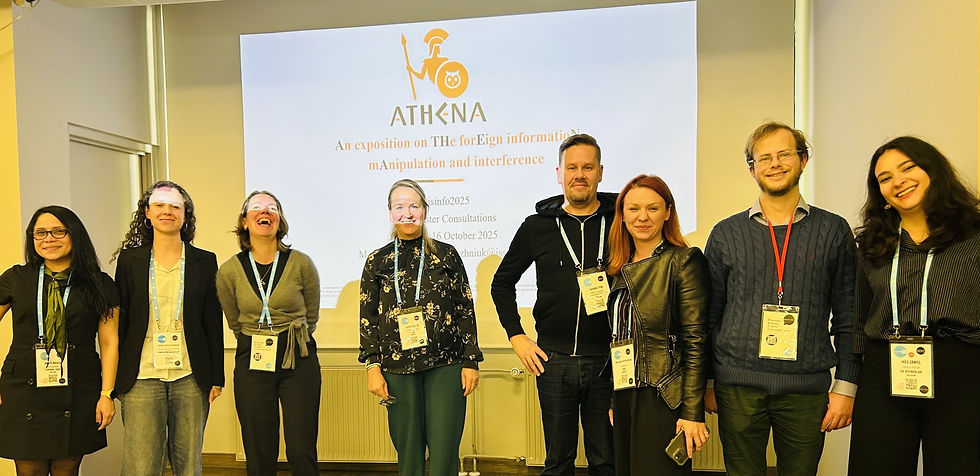ISSP, as the ATHENA partner, moderated FIMI cluster at EU DisinfoLab 2025 conference: Addressing AI-enabled information manipulation
- Denys Korkin

- Oct 21, 2025
- 2 min read

ISSP, your trusted international cybersecurity services provider, moderated the #FIMICluster at the EU DisinfoLab 2025 conference, as the ATHENA partner, for the second time – an informal closed-door meeting bringing together over 10 researchers engaged in European projects focused on combating information manipulation.
The 90-minute concentrated discussion revealed hard truths about defending democracy in the AI era, while reinforcing the firm belief that united efforts can transform threats into new opportunities for strengthening democratic resilience.
ISSP's Perspective
"From the intersection of cybersecurity and democratic resilience, it's clear: the tools exist. Legal frameworks are in place. What's missing is coordination and implementation," noted ISSP representatives at the meeting. "The fight against FIMI isn't just about technology. It's about protecting the kind of information environment in which democracy is even possible."
The Attribution Paradox and the FIMI/DIMI Distinction
When foreign manipulation is executed through citizens drawn into AI-amplified campaigns, traditional attribution frameworks collapse. The fundamental question emerges: how do you distinguish foreign manipulation from domestic when citizens themselves become instruments of influence operations? Researchers emphasized the urgent need for new methodologies that won't turn existing frameworks, including FIMI itself, into yet another battleground.

AI radically changes the playing field
Researchers are continuously running sophisticated AI-enabled campaigns with manual tools, and the asymmetry is growing exponentially.
As one participant aptly summarized: "We're fighting an opponent that has algorithms on their side." This technological imbalance represents one of the most pressing challenges in contemporary information security.
Regulatory frameworks exist – implementation doesn't
The Digital Services Act (DSA) and AI Act have created a robust legal foundation, but many questions remain about their practical implementation. Platforms resist providing open data access, preventing civil society from obtaining the information needed to protect democracy. National implementation practices remain unclear, making it difficult to establish standards for candidate countries on their path to EU membership.
The Ukraine Lesson
Hybrid warfare demands a fundamental rethinking of content moderation algorithms. When platforms delete documentation of war crimes and testimonies of victims of Russian aggression under the pretext of removing "harmful content," the system is broken at a fundamental level. This reality underscores the need for context-aware approaches to content moderation.
The #FIMICluster discussion reinforced that addressing information manipulation requires not only technological solutions but also coordinated implementation of existing legal frameworks and closer collaboration between researchers, civil society, platforms, and regulatory bodies.
The ATHENA project consortium includes the following partners: Hellas (FORTH, Greece), University of Cyprus (UCY), Bavarian Police Academy (Germany), Research Institutes of Sweden (RISE), Laurea University of Applied Sciences (Finland), Eurecat Foundation (Spain), Storyzy (France), Trinity College Dublin (Ireland), European Organisation for Security (Belgium), Maldita (Spain), EU-Disinfo (Belgium), Dublin College (Ireland), ISSP (Ukraine), and Trilateral Research (United Kingdom).


